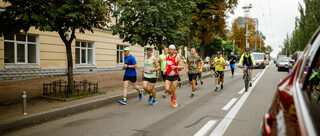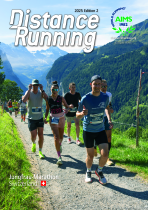Marathon movers
31 March 2023, 7am UTC
Ukraine keeps on running
The war in Ukraine started at 06.00 on 24 February 2022. On that first day all Ukrainians' thoughts, actions and states of mind were fully concentrated on it. Some were fighting, some were dying, some were saving their families, some were starting to prepare their homes and cities for the battle.
I have connections with a lot of running friends in Ukraine. After three days I saw Kharkiv runners appearing in my feed. They were exchanging information on which side of the city the artillery fire was coming from and where not to run. Someone said that he had almost run into the tanks. Some suggested they should run in groups so that they could at least help in cases of wounding. At that time the front line was right beside Kharkiv, at a distance of a rifle shot. The north-eastern part of the city was shelled incessantly. There are 1.5 million people in Kharkiv and a lot of them left the city in the first days of the war as the best way to protect their loved ones. Runners were thinking about that too, but they also thought about running, because they always do – even during war.
In the early days of the war Kyiv had columns of tanks on the approach roads up to 60km long and fierce fighting was taking place. In the feed I saw familiar faces: I had seen them before at the starting corrals, or at the finish line with a medal and a smile on their faces. Now they were the faces of soldiers in uniform with machine guns.
Not all runners joined the army. They were also in the back line ready to defend the city. They did not leave but they had difficulty running. Ordinary people greeted the runners in a half-empty Kyiv sometimes with disapproval, sometimes with bewilderment: “How can you run when we could all die here?” was the unspoken question. Runners complained about this but were already going out for runs in the second week of the war.
When war was sprung upon us I was recovering from coronavirus. I went out for a run on 27 February. I was not afraid of the war, of the shelling, but I anticipated the disapproval of ordinary people so I ran in the woods. After a few days I started running in the city. It seemed to me that the familiar sight of runners in the city should be comforting – the city was living its life.
Since 24 February there have been no official race starts in Ukraine. Every city is always on air raid alert and it is not safe to be outside. As organisers we cannot risk the lives of others, but going out for a daily run is a personal matter and the decision of each runner. Unofficially, runners meet for small local competitions, primarily to raise money for the army and to buy weapons. Almost every week runners hold small races of 100–300 people in different cities around the country.
The running community takes an active part in the defence of the country. First and foremost within the ranks of the armed forces. But there are also instances where running has helped focus national efforts. In August a Ukrainian amateur ultramarathoner, Vladimir Skorovorodka (Vova), ran an 880km charity ultrarun from Kyiv to Warsaw. He attracted the attention of a huge number of people in Ukraine. His efforts raised money for equipment for the de-mining of the Black Sea.
As a runner it was an amazing example. Vova works as a lifeguard and has been rescuing people from under the rubble of the bombings every day since the start of the war. He works 24/7 and has almost no time to train. To run 880km in 14 days without training was a tremendous achievement. Much to my surprise Vova was able to cover the distance at a very respectable pace of 4:40-5:10 min/km. In every town local running clubs ran with him as support. Our company helped with the organisation of this challenge and I had the honour of running the first 15km with Vova.
Our NEWRUN team continues to work. We have learnt a lot in our nine years of conducting running events. We had a unique experience of holding up to 14 marathons and half-marathons a year in the largest cities of Ukraine with up to 10,000 participants. Few other organisers had such a busy schedule. We are currently working on the possibility of holding events in Europe which will help to raise more money for the Ukrainian military effort. These races would give Ukrainians a chance to take part in our races abroad.and we would be glad to get help from the running community with organisation or ideas.
For many Ukrainians running has been an emotional escape since the war began. Running, like nothing else, gives a sense of self-confidence and triumph. We continue to champion the idea of running in Ukraine: running is a piece of peace at a time when we are at war in our country. Many of those who read these lines will know that feeling of honesty and unity among runners before the starting shot. At this moment everyone understands each other without words and strangers become very close. The starting line unites all of us with the same thoughts and the same distance ahead. Ukrainian marathon runners stay in the same corridor as the runners of the world, and I am sure that all the runners of the world are close to Ukraine.






